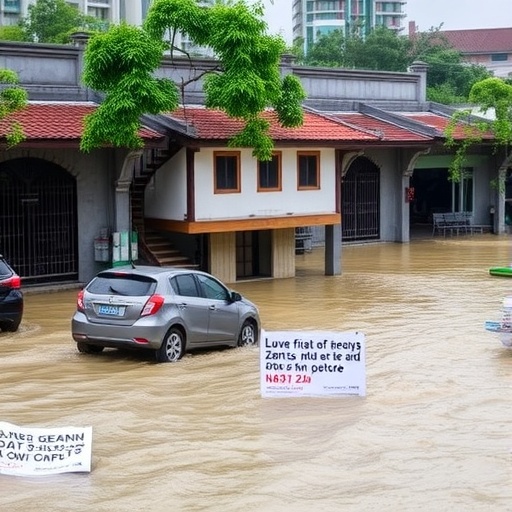The devastating Henan flood of 2021 has emerged as a pivotal moment in the discourse surrounding climate change adaptation in China. Recent research conducted by Shen S.V., published in Commun Earth Environ, highlights the significant shift in public sentiment regarding government intervention and climate resilience strategies post-disaster. The flood, which wreaked havoc on the region, not only caused tragic loss of life and property but also illuminated the vital role that effective governance plays in managing climate change impacts.
In the wake of the flood, citizens found themselves increasingly aware of the vulnerabilities inherent in their environments, leading to heightened demands for government-led initiatives to tackle climate change effects. Shen’s study meticulously documents how the catastrophic event served as an awakening call for many, ultimately reshaping public expectations towards proactive governmental responses. The flood’s aftermath revealed that an overwhelming majority of citizens were not merely passive observers but active stakeholders in the discussion surrounding climate change and adaptation strategies.
The public’s response to the Henan flood underscored a critical juncture in climate dialogue in China. The sheer magnitude of the disaster brought to light not only the immediate physical damage but also the long-term implications for communities that were previously unengaged in such conversations. Citizens began advocating for a restructuring of governmental priorities, demanding that climate adaptation be brought to the forefront of policy agendas. This pronounced shift paved the way for transformations in how climate initiatives are designed and implemented at both local and national levels.
Shen’s research presents a comprehensive survey of citizen attitudes following the flood. It illustrates the direct correlation between experiencing climate-related disasters and increased support for substantial government-led adaptation measures. As the research shows, more residents began to recognize the urgent need for comprehensive assessments of infrastructure resilience, urban planning, and disaster management strategies. Such insights challenge previous notions where citizens exhibited a degree of apathy towards climate policies, thereby asserting a new paradigm where public engagement is pivotal for effective climate action.
Moreover, the analysis provided by Shen emphasizes the critical need for educational campaigns that inform citizens about climate risks and adaptation strategies. Such efforts not only equip individuals with knowledge but also empower communities to take a more active role in advocating for their rights to a safe and resilient environment. The research suggests that educational initiatives can serve as a bridge, connecting government resources with citizen needs and fostering collaborative approaches to climate resilience.
In examining the government’s role, the study highlights how officials can harness this newfound public interest as an opportunity to prioritize climate adaptation. By responding to citizen demands with transparent and actionable policies, governments can strengthen trust and cooperation between authorities and communities. This transformation from a reactive to a proactive governance model could mark a significant advancement in achieving long-term climate resilience throughout different regions of China.
The Henan flood also exemplifies the interconnectedness of climate issues with socio-economic factors. Shen’s findings reveal that marginalized communities were disproportionately affected by the disaster, which necessitates tailored adaptation strategies that address these vulnerabilities. Thus, a comprehensive approach to climate change must consider social equity and seek to empower the most affected populations. This insight is crucial for the formulation of policies that do not simply restore the status quo but instead build broader resilience against future climate shocks.
Furthermore, the study reveals that the demand for government-led climate initiatives is not solely limited to urban centers but resonates within rural communities as well. Historically overlooked in climate discussions, rural populations are now vocalizing the crucial need for resources and support for their adaptation challenges. Residents are increasingly recognizing their unique vulnerabilities and advocating for tailored governmental responses that cater to their specific contexts.
The implications of this shift extend beyond local governance; they signal a broader trend that can shape national climate policies. The public’s willingness to engage and express their needs may serve as a foundational element in the development of innovative bureaucratic frameworks that prioritize climate resiliency at the heart of governmental agendas. By taking this citizen-centered approach, authorities stand to gain not only public approval but also improve the efficacy of adaptation strategies.
In addition, Shen’s work calls attention to the importance of international cooperation in the face of climate change challenges. The widely recognized need for collaborative frameworks to share knowledge, resources, and technologies must be emphasized, especially as climate change knows no borders. Governments, researchers, and activists alike can leverage collective expertise to devise actionable solutions that resonate with citizens’ experiences and needs.
As the world faces an escalating climate crisis, the Henan flood serves as a crucial case study that reveals the dynamics between citizen engagement and government response. Shen’s research encourages a rethink of the traditional roles that citizens and the state play within this context. It suggests that constructive collaboration is imperative to produce effective adaptation strategies, creating a resilient society in the face of inevitable climate-related challenges.
In conclusion, the ramifications of the 2021 Henan flood extend beyond loss and disaster; they provide essential insights into citizen-government dynamics regarding climate adaptation in China. Shen S.V.’s thoughtful analysis reveals how a disaster can catalyze change, forming a new narrative surrounding climate resilience that actively includes citizen voices. By embracing this transformative perspective, both governmental authorities and communities can work together to navigate the complexities of climate adaptation, ensuring a safer, more resilient future for all.
Subject of Research: Increasing Citizen Demand for Government-Led Climate Change Adaptation Following the 2021 Henan Flood
Article Title: The 2021 Henan flood increased citizen demand for government-led climate change adaptation in China.
Article References:
Shen, S.V. The 2021 Henan flood increased citizen demand for government-led climate change adaptation in China. Commun Earth Environ 6, 730 (2025). https://doi.org/10.1038/s43247-025-02745-9
Image Credits: AI Generated
DOI:
Keywords: Climate Change, Government Adaptation, Citizen Engagement, 2021 Henan Flood, Environmental Policy




